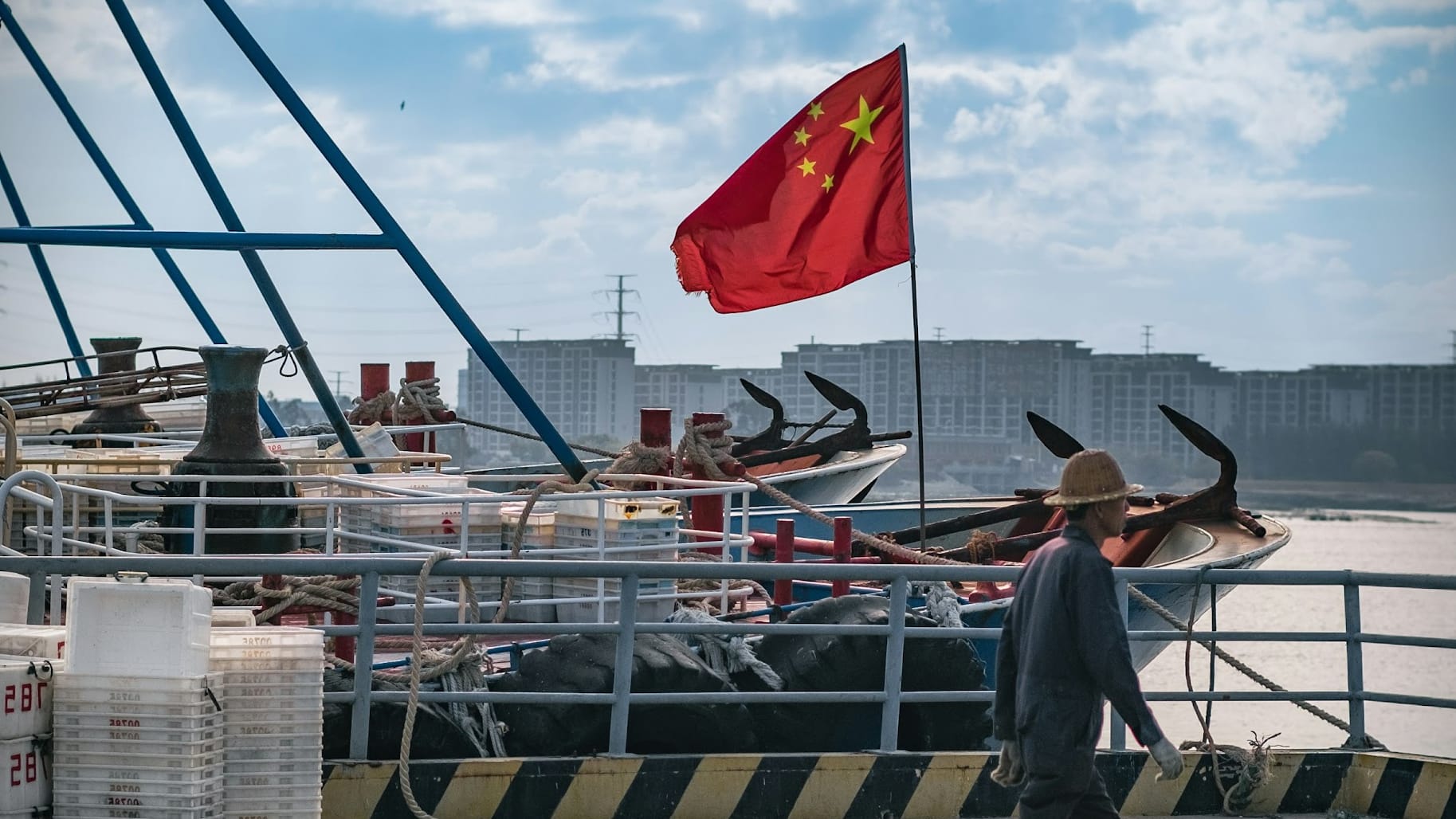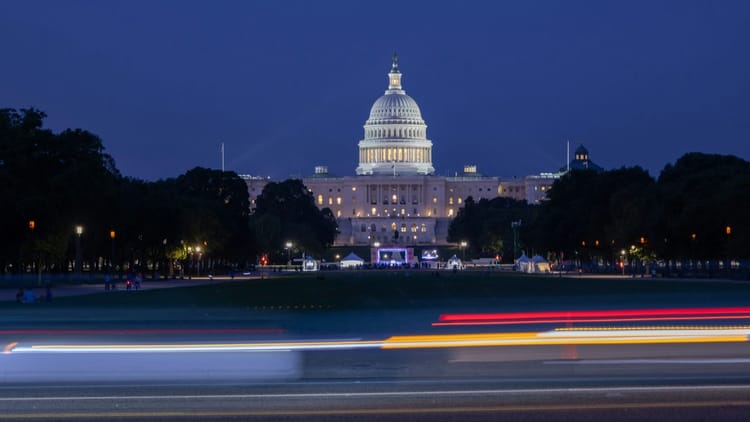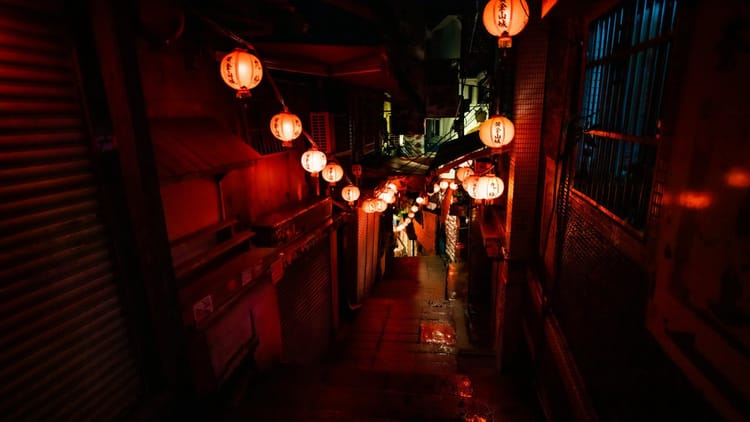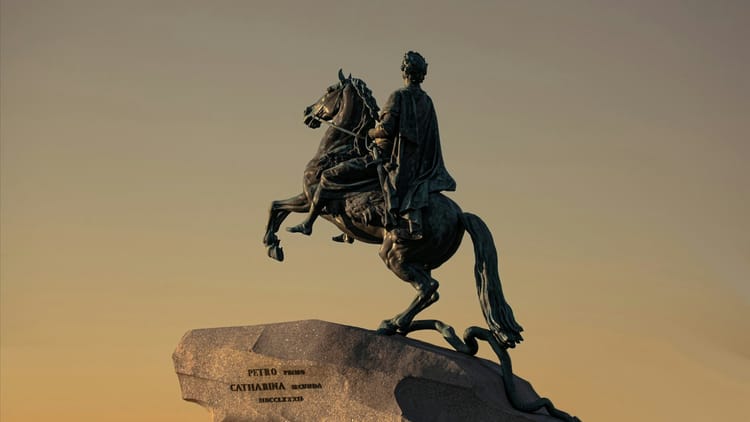Seen in hiding

Recently: The weekend despatch: Agreeing to disagree in the Middle East. Sanctions against the little guys in Europe. &c.
Today: Can the Nobel protect someone a regime wants dead? Venezuelan opposition leader María Corina Machado won it on Friday, while underground, threatened with arrest, and leading a movement the Maduro government calls terrorism. The committee knows this—and awarded her anyway.
+ For members: Is anyone winning the U.S.-China trade war? Kyle Chan on the economic showdown between Washington and Beijing.
& New music from Tortoise ...
Developments
- Trade war breaks out again. U.S. President Donald Trump said on Friday he’d impose an additional 100 percent tariff on Chinese imports—on top of existing 30 percent duties—starting November 1, after China tightened export controls on rare earth minerals critical for semiconductors and defense. Markets plunged: the S&P 500 dropped 2.7 percent, its worst day since April’s trade-war chaos. Trump also threatened export controls on “critical software” and suggested canceling his planned meeting with Chinese President Xi Jinping later this month. By Sunday, China’s Commerce Ministry said Beijing is “not afraid of” a trade war. … See “What doesn’t kill them: Kyle Chan on the economic showdown between Washington and Beijing.”
- Two years in captivity ends. Hamas released the last 20 living Israeli hostages on Monday morning—though only four bodies of deceased hostages were returned rather than the promised 28—as part of the American-brokered peace deal, ending more than two years of captivity that began with the October 2023 Hamas attacks. Trump traveled to Jerusalem, addressed Israel’s parliament, then attended a peace summit in Egypt with leaders from more than 20 countries. Israel freed nearly 2,000 Palestinian prisoners in exchange, including 250 serving life sentences.
- Combat between nuclear neighbors. Afghanistan and Pakistan traded deadly fire along their frontier Saturday night in the worst clashes since the Taliban returned to power, with Pakistan claiming 23 of its soldiers were killed and Afghanistan saying 58 Pakistani troops died. The fighting followed Pakistani airstrikes on Thursday in Kabul targeting militants from Tehreek-e-Taliban Pakistan, an insurgent group fighting Pakistan’s government, which Islamabad accuses the Afghan Taliban of harboring. Both countries closed their border crossings on Sunday.
- Federal force without limits. U.S. federal immigration officers are using increasingly brutal tactics during arrests, including tackles, pepper balls, and gunfire, as recorded on video across multiple cities. In Chicago, officers shot a woman and killed a man in separate incidents; a pastor was hit in the head with a pepper ball at an ICE facility; a 15-year-old girl was tackled in a Chicago suburb. Key context, according to former U.S. Customs and Border Protection Commissioner Gil Kerlikowske: ICE officers “do not have the training or skillset to police an urban environment.”
- Shutdown in America, day thirteen. The U.S. federal government stayed closed on Monday with no resolution in sight, as the impasse between Republicans and Democrats over spending entered its 13th day. Trump said his administration has “identified funds” to pay military personnel on October 15, while more than 4,000 federal workers got layoff notices on Friday. The Smithsonian museums and National Zoo closed Sunday after running out of prior-year funding.

Seen in hiding
The Venezuelan opposition leader María Corina Machado, who won the Nobel Peace Prize on Friday—dedicating it, in part, to President Trump—has spent the past year in hiding after the regime of Nicolás Maduro barred her from July’s presidential election. When Machado briefly emerged in January for a rally in Caracas, government forces opened fire on her motorcade. The Norwegian Nobel Committee called her “one of the most extraordinary examples of civilian courage in Latin America in recent times.”
Machado won the prize while in hiding, where she remains—her struggle unresolved, threatened with arrest, leading a movement the regime categorizes as “terrorism.” The Committee of course knows this. Past prizes have often recognized concluded struggles—as with Nelson Mandela after the end of Apartheid. But they also occasionally recognize struggles in their midst—turning the honor into both a shield and a signal: The Chinese activist Liu Xiaobo won while imprisoned in China; the Belarusian Ales Bialiatski got his from a cell in Minsk; now Machado, while still underground.
Remarkably, the White House complained the Committee had chosen “politics over peace” in awarding her over Trump, despite Machado’s gesture—and despite U.S. Secretary of State Marco Rubio having cosigned a letter nominating her for the prize in November 2024, while Rubio was still a Senator and, by all appearances, in a different frame of mind.
Wary of fast fashion?
Shop Congo Clothing Company and
make a difference—in style.

Feature
What doesn’t kill them
Is anyone winning the U.S.-China trade war? Kyle Chan on the economic showdown between Washington and Beijing.

It’s a conflict that’s been building for months.
U.S. President Donald Trump called April 2, 2025, “Liberation Day.” He raised tariffs worldwide to hit back at countries he said had “ripped off” America—with one country in particular in his sights: the People’s Republic of China. By April 10, U.S. tariffs had reached 125 percent on Chinese goods. Beijing imposed its own retaliatory tariffs.
Both countries pulled back from a full-scale trade war after negotiations, and by May had lowered tariffs—the U.S. to 30 percent, China to 10 percent. But the struggle for global economic primacy continues. The U.S. has imposed export restrictions on high-end semiconductor chips. In September, China’s market regulator announced an ongoing investigation into Nvidia, the American multinational that leads in chips for high-performance computing. Nvidia, the regulator said, had breached Chinese anti-monopoly laws.
Earlier this month, Trump said the U.S. government will support American farmers who’ve seen China reduce imports, especially of soybeans. “We’ve made so much money on Tariffs, that we are going to take a small portion of that money, and help our Farmers. I WILL NEVER LET OUR FARMERS DOWN!”
Then on Friday, October 10, came a shock escalation. China had tightened export controls on rare earth minerals—critical for high-tech industries, from semiconductors to defense—and Trump responded by announcing an additional 100 percent tariff on Chinese goods, on top of the existing 30 percent. That brings total U.S. tariffs on China to roughly 130 percent, close to the “Liberation Day” levels. Trump also threatened export controls on “any and all critical software” starting November 1. Stock markets plunged—the S&P 500 dropped 2.7 percent, its worst day since April’s trade war chaos. Trump suggested he might cancel his planned meeting with Chinese President Xi Jinping later this month. On Sunday, China’s Commerce Ministry said Beijing is “not afraid of” a trade war.
China is clearly retaliating. But what’s its strategy?
Kyle Chan is a postdoctoral research associate and lecturer in the Department of Sociology at Princeton University. Chan says Beijing views the United States as the only rival capable of thwarting its rise, and it’s acting accordingly. Chinese exports now increasingly target emerging markets in the Global South to reduce the leverage Washington can bring to bear by restricting Chinese companies’ access to the American market. Meanwhile, Chinese political leaders have been reaching out to other Asian countries, hoping to build the kind of international partnerships the U.S. already has. Washington, Chan says, weighs heavily on Beijing’s calculations.
The view from the White House is that China is weak. And there’s something to that. This is an inconvenient time for China to face American trade restrictions: China’s still reeling from the slow-motion burst of its property bubble, after real estate had been a key driver of growth and employment. Now, the country’s high growth rates are history. But even if China is reeling, Chan says, it’s not as weak as some Trump officials think. And by underestimating Chinese innovation, Washington might end up making it stronger …
Your loyal guide to a changing world.
Membership with The Signal means exclusive access to premium benefits:
- Regular profiles on the questions behind the headlines
- In-depth feature interviews with our network of specialist contributors from across America and around the world
- The despatch, our weekly current-affairs and cultural-intelligence briefing
- Early access to new products, including print extras
It also means vital support for an independent new enterprise in current-affairs journalism.
’Layered Presence’
Four decades in, Chicago post-rock group Tortoise continues to make music that defies categorization. The sound here evokes a film score for a movie that doesn’t exist—a light guitar line layered over vaguely ancient percussion traditions. Jazz-ish, but not jazz. And the band behind it, less a conventional ensemble than an unusual collective of musicians in conversation, each voice distinct but cohesive.





